
The Afghanistan national team are in India to play their first Test match, at Bengaluru’s M. Chinnaswamy Stadium from 14 to 18 June. With this, they stand to become only the 12th nation to play Test cricket. For a nation that only became an affiliate member in 2001 and an associate member in 2013, this feat is pretty remarkable.
Having become a full member in 2017, the Afghanistan National cricket team has moved up the cricketing ladder at lightning-fast pace. Yet, they probably face their most daunting challenge yet, starting 14 June. Playing against the No. 1 ranked Test team in the world, a side that has grown to become practically invincible at home, Afghanistan will have to be up for the challenge from the moment the game starts, against a very sharp Indian unit.
Ajinkya Rahane will be leading the hosts in Virat Kohli’s absence while the visitors will be skippered by Asghar Stanikzai. The visitors, who were awarded Test status by the ICC in June 2017, are coming into this one-off test on the back of a 3-0 series whitewash of the Bangladesh team in a T20 International series played in India.
While Afghanistan can now boast of some sort of pedigree in the shorter formats of the game, how they adapt to the grueling nature of Test cricket is yet to be seen. As star Afghanistan spinner Rashid Khan summarised, it would be a true ‘test’ of patience for the young cricketing nation, and definitely “will be a big day for cricket in Afghanistan”.
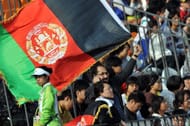
While Afghanistan ready themselves for their first ever Test match, let us take a closer look at how all debuting nations have fared in their opening Test matches, starting from the inaugural Test between Australia and England (March 1877) to the match between Ireland and Pakistan (May 2018).
Debuting nations have never won a Test match, barring the opener between Australia and England, and most nations have played their first ever Test match against the English (6), followed by India (3). Afghanistan becomes the 4th nation to start their Test history against the Indian national team.
Australia and England: 15-19 March, 1877
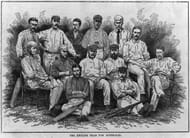
Result: Australia (245 & 104) beat England (196 & 261) by 45 runs
Venue: Melbourne Cricket Ground, Melbourne
The first Test match in the history of the game was played between now Ashes rivals Australia and England. Australia won the match at the MCG by 45 runs. Contrary to modern day rules, each over had only 4 deliveries.
As one would imagine, the match had a lot of ‘Firsts’ including the first Test century and the first five-wicket haul in Test matches; but as fate would have it, the match also witnessed a record that has withstood the test of time even up until now. With Australia batting first after winning the toss, opener Charles Bannerman retired hurt at 165 not out with Australia at 240/7; and Australia eventually got bundled out for a score of 245. Bannerman scored 69.6% of his team’s runs excluding extras (there were 8 extras), a record that stands to date!
South Africa (vs England): 12-13 March, 1889 (3-day match)
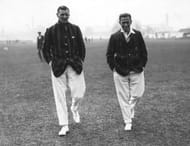
Result: South Africa (84 & 129) lost to England (148 & 67/2) by 8 wickets
Venue: St. George’s Park, Port Elizabeth
The match, then referred to as South African XI against Major Warton’s XI, was retrospectively awarded Test status and renamed South Africa vs England in 1897. The match was played on a green matting, that led to it being a low scoring affair, with Englishman Robert Abel top scoring with 46 in his side’s first innings.
Incidentally, this was also South Africa’s first First-Class match as there had been no First-Class cricket in South Africa before 1889. Allocation of retrospective status was bound to be controversial and it was argued that standards in South Africa were so poor that the two matches should not have been rated first-class, let alone Test.
West Indies (vs England): 23-26 June, 1928
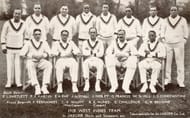
Result: England (401) beat West Indies (177 & 166, following-on) by an innings and 58 runs
Venue: Lord’s, London
England, despite being troubled initially by the West Indian quicks, ended Day 1 at 382/8; and 24 June was taken as a rest day. West Indies went on to lose the match by an innings, following-on in their second innings.
So dismal was the West Indian performance on that entire tour, that this is what Wisden had to say about them after the tour, "So far from improving upon the form of their predecessors, the team of 1928 fell so much below it that everybody was compelled to realise that the playing of Test matches between England and West Indies was a mistake. Whatever the future may have in store, the time is certainly not yet when the West Indies can hope to challenge England with a reasonable hope of success.”
Who would have thought then what the future nearly 50 years later would have in store!
New Zealand (vs England): 10-13 January, 1930
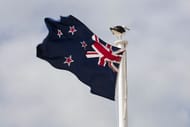
Result: New Zealand (112 & 131) lost to England (181 & 66/2) by 8 wickets
Venue: Lancaster Park, Christchurch
Such was the dominance of the English cricket team back in those days, that they were simultaneously touring two countries. While one contingent had arrived in New Zealand to play the first Test match in Kiwi history, the other was touring the West Indies, a team that had themselves received Test status only 2 years back.
Their first match was one to forget for the hosts. The Kiwi team managed two low-scoring totals and England went on to win the match with extreme ease. English bowler, Maurice Allom, albeit a debutant, took 4 wickets in 5 deliveries, including a hat-trick in the first innings.
India (vs England): 25-28 June, 1932
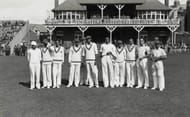
Result: England (259 & 275/8, declared) beat India (189 & 187) by 158 runs
Venue: Lord’s, London
India became the 6th country to be awarded Test status in the summer of 1932. Led by Douglas Jardine and his pair of half centuries, England defeated India, led by C. K. Nayudu by 158 runs.
This was the only Test match played on the tour. The Indian (then undivided India) contingent had 7 Hindus, 4 Muslims, 4 Parsees, and 2 Sikhs, which later led modern-day historian, Ramachandra Guha to comment that the selection “nicely reflected the balance of communal interests”!
India’s Amar Singh and Mohammad Nissar drew a lot of praise for their performance with the ball, troubling almost all Englishmen, with Jardine’s half-century and partnerships in either innings turning out to be the biggest difference maker.
Pakistan (vs India): 16-18 Oct, 1952 (4-day match)
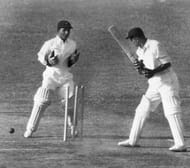
Result: India (372) beat Pakistan (150 & 152) by an innings and 70 runs
Venue: Feroz Shah Kotla, Delhi
Interestingly, despite being Pakistan’s first Test match, only 9 Pakistani players made their debut, as two Pakistani players had already played Test cricket for undivided India. Vinoo Mankad’s 13 wickets in the match led the way for India, who went to win the match by an innings.
Ironically, Mankad was also India’s opening batsman, but contributed only 11 runs with the bat. Hanif Mohammad scored a half-century (51) for Pakistan in the first innings, while India’s number 11, Ghulam Ahmed, scored 50 runs in India’s lone innings. For Pakistan, 7 players in the first innings, and 8 players in the second innings, had scores in single digits.
Sri Lanka (vs England): 17-21 February, 1982
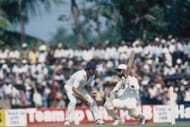
Result: Sri Lanka (218 & 175) lost to England (223 & 171/3) by 7 wickets
Venue: PSS, Colombo
Like other first Test matches, this was a match of firsts for Sri Lanka, especially skipper, Warnapura. Warnapura opened the batting along with Wettimuny, and faced the first delivery from Willis. He also scored the first run for Sri Lanka, and according to a local newspaper, was the first to be hit on the chest.
Warnapura then became the first batsman to lose his wicket. Ranjan Madugalle, who most of today’s generation would only be able to relate to as a match referee (he holds the record for most international matches as match referee, at 564), top-scored for Sri Lanka with 65 runs in the first innings and along with Ranatunga led them to a score of 218 after they were reeling at 34/4.
After a closely contested ODI series, which ended 1-1, England comfortably took the lone Test match by 7 wickets.
Zimbabwe (vs India): 18-22 Oct, 1992
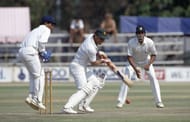
Result: Zimbabwe (456 & 146/4), India (307), Match drawn
Venue: Harare Sports Club, Harare
This was the first occasion since the inaugural Test match in 1877, when the team playing its first Test match did not suffer defeat. Dave Houghton scored a century for Zimbabwe in their maiden Test with a score of 121 in their first innings.
Like Pakistan’s first Test, not every Zimbabwe player made their debut, as John Traicos had already played Test cricket for South Africa. Traicos also took Zimbabwe’s first 5-wicket haul. Sanjay Manjrekar hit a century for India in their lone innings with the bat. Many experts were critical of the lifeless pitch which lent little support to either bowling unit, resulting in a rather dull draw.
Bangladesh (vs India): 10-13 Nov, 2000

Result: Bangladesh (400 & 91) lost to India (429 & 64/1) by 9 wickets
Venue: Bangabandhu National Stadium, Dhaka
Aminul Islam Bulbul scored a century on debut for first-timers Bangladesh, as he top scored in the match with his first innings knock of 145. That wasn’t enough for the hosts though as the visiting Indian team thumped them by 9 wickets.
Sunil Joshi was India’s star with both bat and ball, taking 5 wickets in Bangladesh’s first innings and then top-scoring for India with 92 runs in their first innings with the bat. This was the only match played in India’s tour of Bangladesh that year. At this point in time, barring the inaugural Test where both countries were debuting, England and India remained the only two countries against which any other country had played their first Test match.
Ireland (vs Pakistan): 11-15 May, 2018
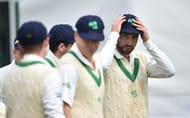
Result: Pakistan (310/9, declared & 160/5) beat Ireland (130 & 339, following-on) by 5 wickets
Venue: The Village, Malahide
The first day’s play was completely washed out by rain, giving Ireland the unique distinction of having their first day in Test cricket history washed out. Despite being on the wrong side of the result, Kevin O’Brien, who became the first Irish cricketer to play 300 matches for his country, was awarded the Man of the Match award for his scores of 40 and 118 in the first and second innings respectively.
Every Irish player except Boyd Rankin made their Test debut, as Rankin became the first Test cricketer since Kepler Wessels in 1994 to play Test cricket for more than one national side. Incidentally, the Irish men’s national team made their Test debut 18 years after their women’s counterparts had played their first Test match, also against Pakistan, in 2000.
How do you think Afghanistan will fare in their debut? Let us know in the comments.
Follow IPL Auction 2025 Live Updates, News & Biddings at Sportskeeda. Get the fastest updates on Mega-Auction and cricket news
